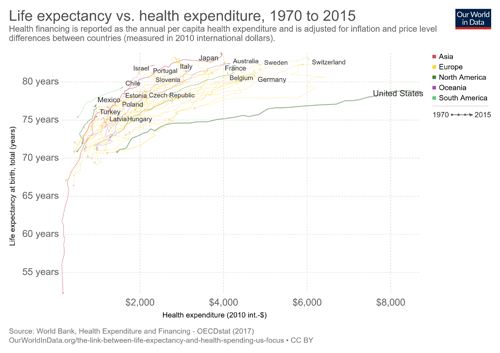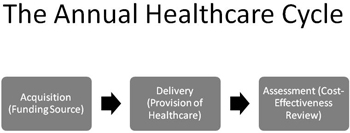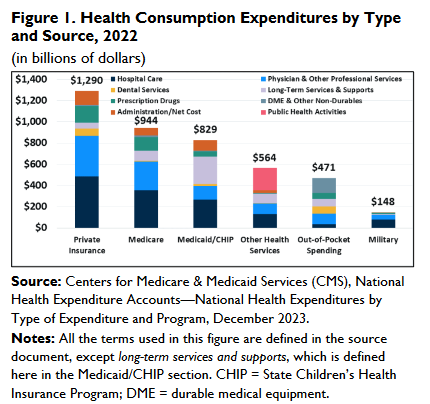HEALTH IS WEALTH
It's often stated that knowledge is power. If knowledge is power, then health is wealth. That is to say, having a store of good physical and mental health can be likened to having a store of vast monetary wealth.
It's also stated that your body is your temple, which is another way of saying that your good physical and mental health is of paramount importance to your longevity. In many respect, maintaining good health is not too different from obtaining financial wealth. Financial success requires discipline, focus, and devotion as does maintaining good health.
The purpose of this page is to provide a brief examination of the state of global healthcare, in general, and of the state of USA healthcare, in particular. If given a choice between good physical and mental health and having lots of money, then I would choose to have good physical and mental health every single time. There simply is no substitute on Earth for your good physical and mental health.
TOWARDS UNIVERSAL HEALTHCARE
This page begins with the premise that all humans ought to be able to enjoy their brief 80 or so years of life on Earth in fairly good health. It would be extremely difficult for you to enjoy life if, throughout your lifetime, you constantly are beset with some form of sickness, disease, or pain.
The belief that all humans ought to be able to enjoy life on Earth (in good spirits, safety, and health) is not new. Throughout human history, proposals have been advanced for attaining minimum standards of human existence. Perhaps one of the more recent and most recognizable proposals is the Universal Declaration of Human Rights. All countries ought to consider striving to achieve the minimum standards of living set forth in the Universal Declaration of Human Rights.
If universal healthcare is to be included in this minimum standard of human existence, then basic healthcare moves from the realm of being a privilege (of those who can afford to purchase good healthcare) to the realm of being a basic human right (legally guaranteed to all members of society).
From the moment of birth and up to the point of death, across the centuries, humans tend to expand their conceptions of what constitutes the good life. In the 21st century, one common goal of humans is to live a long, healthy, happy, secure, and prosperous life. If you happen to be born in one of the poorer countries on Earth, then malnourishment coupled with a lack of hygiene facilities can be major impediments to good health (for example, a lack of indoors plumbing, sewage treatment facilities, and water treatment facilities).
Technological sophistication and professional proficiency in a given society also are critical components of good health. At the same time, even the most technically proficient society is of little benefit to many of its citizens if its citizens cannot afford to purchase access to those sophisticated health facilities.
Different countries have different traditions, histories, economic resources, stages of development, and so forth. Countries generally strive to make the most of the resources at their disposal when dispensing healthcare to their citizens.
As is often the case with anything on Earth, the overriding issue always comes down to money. Few humans would disagree with the idea of providing all citizens with access to some minimum standard of healthcare. The overriding concern always is this (both for citizens and for businesses): How much is this going to cost me? If some members of society perceive that the cost of a product is too high or as being beyond their ability to pay, then they would be willing to—or would be resigned to—live without that particular product (such as healthcare) even if it is to their detriment to not have the product. Households—and businesses—tend to be more accepting of an incremental increase in the cost of a product as compared to, say, a sudden doubling, tripling or quadrupling of, say, their healthcare expenditures.
One of the functions of government is to collect taxes from citizens to purchase products that generally enhance the overall welfare of society. Local, state, and federal governments collect lots of taxes and spend those tax monies to directly and indirectly purchase a wide array of goods and services. While most citizens might not object to the government spending their tax dollars to purchase one type of product, they might vehemently object to the government spending their tax dollars to purchase another type of product. For instance, while many citizens might not have too much of a problem with being taxed to pay for, say, highway construction, lots of citizens might become highly resentful of being taxed to pay for, say, food stamps. Although the poor might not be able to pay taxes to support highway construction either but yet the poor, too, are beneficiaries of the newly constructed highways, some tax payers tend to be more accepting of tax spending on things such as highway construction because they benefit from using the highways. These same tax payers tend to view social welfare programs such as food stamps as giveaways or income transfers from them to those (the poor). These poorer members of society, in turn, are perceived as being non-contributors, unworthy, underserving, and wasteful of the income transfers. Some taxpayers tend to be resentful of social welfare spending because social welfare spending provides no direct benefit to them (as does, say, driving on the newly constructed highway). It should be noted, moreover, that even those members of USA society who tend to be resentful of social welfare spending do tend to be very charitable when a natural disaster strikes.
The truth of the matter is this: When one person in society is lifted out of poverty by government spending, then the entire society benefits. As I noted on the "Education for All" page of this website, the general idea of a civilized society is to foster an environment whereby all citizens can become productive, responsible, self-supporting, and law-abiding members of society regardless of the career niche they choose, that is, whether an academic, athletic, artistic, or vocational niche and regardless of their race, color, creed, ethnicity, gender, sexual orientation, religious belief, disability, national origin, socioeconomic birth status, political ideology, and so forth. I'll use myself as an example. My undergraduate college education basically was funded by a government BEOG grant (Basic Educational Opportunity Grant) courtesy of USA taxpayers (and Senator Claiborne Pell of Rhode Island). I don't know about you, but I think that the USA taxpayer made a fairly good investment in me. I am very grateful for the college assistance that I received. After all, I did proceed to become a productive, tax-paying member of society. I did not resort to a life of crime. I did not become yet another social problem for society (such as constantly going to jail). I did not become a lifelong burden on society. In my case, social welfare spending was a bootstraps tool for fostering upward social mobility. The point, however, is this: Spending for the public good, even if it does not provide a direct benefit to you (such as a highway to drive on), can raise the quality of life for the entire society.
THE HOLY GRAIL OF HEALTHCARE: QUALITY, COST, AND ACCESS
The Holy Grail of any healthcare system in the world is to receive high marks when it comes to being rated on the Big Three:
- Quality of Healthcare
- Cost of Healthcare
- Access to Healthcare

The actual healthcare outcomes of a given healthcare system usually are mixed. For instance, a given healthcare system might score extremely high marks on containing healthcare costs relative to other healthcare systems. It might score low marks on, say, its quality of healthcare provided. It might receive mediocre marks on, say, its access to healthcare.
HEALTHCARE: A PRIVATE OR PUBLIC GOOD
On the "The Market System" page of this website, I mentioned several instances whereby the private market system seems to fail. I mentioned that the government usually intervenes into the private marketplace when there is a systemic failure. I gave an example of public parks. I noted that members of society might decide that everybody should be entitled to go to the park and enjoy the open space without having to pay an entrance fee to do so. The ability to go the park, then, would be treated as a right instead of a privilege. Parks would become a public good in that the local, county, regional, state, or federal government would purchase a parcel of land, develop it, and use tax monies to maintain it as a park for all members of society to visit and enjoy. In instances where parks contain facilities which require frequent upkeep an maintenance, sometimes the government does charge an entrance fee to the park to offset these ongoing maintenance costs.
Given that members of USA society spend more per capita on healthcare yet receive mediocre marks when it comes to the relative quality, cost, and access ratings, this persistent reality presents one of the strongest arguments in favor of treating healthcare as a public good. While there is a lot of money being made with private-sector provision and delivery of healthcare in the USA, the needle is not being moved in a positive direction when it comes to overall quality, cost, and access relative to other industrialized countries. There appears to be a systemic failure somewhere in the USA healthcare system.

Another argument in favor of treating healthcare as a public good is the fact that society's goal of high quality, reasonably priced, and widespread access to healthcare tends to run counter to the profit motive of private businesses. Generally speaking, private businesses do not concern themselves with the general welfare of society as a whole. Private businesses typically are concerned with maximizing profits and obtaining the highest financial returns for owners and/or shareholders. If anything, instead of broadening coverage, private businesses would seek to contract healthcare coverage to contain costs and maximize profits. Some businesses even engage in the practice of gaming the healthcare system to shift the cost elsewhere and protect their profits. If anything, instead of containing costs, private businesses would seek to raise prices to earn more revenue.
Some businesses even engage in the practice of gaming the healthcare system to shift the cost elsewhere and protect their profits. Practices such as dropping doctors with expensive clients from the covered network, businesses not hiring the 50th employee to avoid providing healthcare coverage, or large businesses opting to pay a penalty by moving their employees into the exchange to get rid of some administrative overhead would be instances of gaming the healthcare system for corporate gain. Of course, moving employees into the exchange would not necessarily be a bad thing if the employees received access to comparable healthcare at comparable cost in the exchange. Even healthy young adults who opt to pay the penalty rather than purchase health insurance coverage would be engaging in a form of gaming the system.
When it comes to private businesses and the free enterprise system, the profit motive tends to be primary whereby civic responsibility comes secondary. It's simply the way the free enterprise system works.
Government normally would intervene into the private marketplace to correct a systemic market failure. Government intervention can take many forms. The most extreme form of government intervention would be a complete government takeover of the system. A lesser form of government intervention would be for the government to provide subsidies or contracts to private businesses for them to take additional actions to alleviate the failure. In the case of healthcare, however, the most prudent form of government intervention would not be a takeover of healthcare.
The following graphics show the choices that any society faces when it adopts a healthcare system. The graphic encompasses healthcare as a public, private (job-related), personal (not job-related), charitable, or mixed good.





PERSONAL HEALTHCARE: AN OUNCE OF PREVENTION
Any discussion of universal healthcare should begin with the kinds of things that you, as an individual, can do to maintain your good physical and mental health. The best defense against poor health is a good offense. A good offense entails doing all of the preventative things that most likely could decrease your chances of becoming plagued by poor health. For, as the saying goes, an ounce of prevention is worth more than a pound of cure.
The following videos and links illustrate some preventative things that you, as an individual, can do to decrease your chances of becoming plagued by poor health as you move through the cycle of life:
Humans can become creatures of habits. If you fall into the habit of doing things that will increase your chances of falling into poor health, then those habits can become very hard to break. For instance, as a child, if you get into the habit of eating lots of fast foods, drinking lots of carbonated soft drinks, eating lots of snack foods such as cookies and candy, not exercising, and so forth, then it is not going to be easy for you to break those habits as a young adult. To further exacerbate your healthy outlook, it is not helpful if you also should choose to partake in other bad habits such as substance abuse (that is, tobacco, alcohol, prescription pills, and illicit drugs) or to engage in other kinds of risky behaviors (that is, violence, gunplay, unprotected sex, texting while driving, and so forth).
At the micro or individual level, good physical and mental health means that you, personally, will take the initiative and the responsibility for engaging in healthy practices. Naturally, nobody can remain as physically fit as, say, an 18-year-old individual, for an indefinite period of time. That is to say, it is inevitable that every human will die one day. As you age, it is only natural for you to expect your health to begin to fail. Much like the parts in an automobile, wear and tear on the body increase with the passage of time. Much like the parts in an automobile, some body parts will fail in due time, and they cannot be repaired or replaced. Much like an engine in an actively used automobile eventually will stop working especially if little maintenance is performed on the vehicle over the course of its lifetime, the body clock, too, eventually will stop ticking.
Death is a fact of life. The preferred death for humans is from natural causes (i.e., failed health) as a result of old age. In the interim, before death arrives, generally speaking, if you take good care of your body, then your body will sustain you. When you take good care of your body, and with all other things being equal such as not falling victim to a fatal accident or natural disaster, there is a much greater chance that you will be rewarded with a long and healthy life span.
The following tools and widgets also can assist you with many types of situations pertaining to your personal healthcare:
- Benefits and Government Assistance Eligibility Tool
- Body Mass Index (BMI) Calculator
- Child Care Finder
- Clinical Trials Eligibility
- Diet and Nutrition - Track Your Diet
- Low Fat Recipes and Low Carb Recipes
- Open Food Facts - World
- Dialysis Facility Comparison
- Doctor and Dentist Directories
- Eldercare Locator
- Flu Shot Clinic Locator
- Food Safety - Ask Your Food Safety Question
- Head Start Program Locator
- Healthfinder
- Health Insurance - Find Options
- Health Online Checkups
- Telehealth.HHS.gov
- Digital Health Directory
- Health Tutorials - Interactive Health Education Resources
- Heart Risk Calculator
- Hospital Comparison
- Medicare-Enrolled Doctors and Healthcare Professionals
- Medicare Card Replacement
- Medicare Plan Finder
- Nursing Home Comparison
- Organ and Tissue Donation - Register to Become a Donor
- Physician Comparison
- Pillbox - Identify an Unknown Pill
- Prescription Drugs
- Public Health Clinics
- American Hospital Directory
- Smoking - Tools to Help You Quit
- Vaccines - Find a Vaccination Center
- Veterans Affairs Benefit and Health Applications Online
- Weight Assessment
- MentalHealth.org - Your one-stop access to Mental Health
- Physical Activity Pyramid
- SAMHSA Behavioral Health Treatment Services Locator
- Psychology Today: Health, Help, Happiness + Find a Therapist
- Find Help - Obsessive compulsive disorder (OCD) and related disorders
- Anxiety and Depression Association of America, ADAA
- The National Domestic Violence Hotline | 24/7 Confidential Support
- National Suicide Prevention Lifeline
- National Human Trafficking Hotline
- 2-1-1.org
- Commonwealth Fund

YRBS Widget




HELPING OTHERS TO ATTAIN BETTER HEALTH OUTCOMES
The following tools and widgets demonstrate other kinds of ways in which you can assist others achieve a higher quality of life through better health:
THE HEALTHCARE CYCLE: ACQUISITION, DELIVERY, AND ASSESSMENT OF HEALTHCARE
It is not enough simply to provide healthcare to members of society. It also is necessary to measure the effectiveness of the healthcare purchased and dispensed. Is the healthcare system achieving the intended outcomes? Are there other more efficient or cheaper ways to obtain the same outcomes—or to attain better outcomes? The healthcare assessment/refinement phase represents the final phase in the healthcare cycle.

How is the performance of a healthcare system measured? At the macro or societal level, two popularly referenced data sources for comparative healthcare results are:
Despite societal or international differences in healthcare systems, the OECD and Common Wealth Fund are able to provide comparative assessments of different healthcare systems.
Although the USA is considered to be one of the most economically and technologically advanced societies on Earth, surprisingly, the USA's performance in the healthcare arena is mediocre relative to other industrialized countries. To be sure, the USA's performance in the educational arena also is mediocre when compared to the educational performance of other industrialized countries. When Top 20 country rankings are made of education, healthcare, and various quality of life measures, the USA usually ranks closer to the bottom of the scale of 20 rather than at the top of the scale.
Perhaps the one factor that distinguishes the USA's approach to healthcare from other industrialized countries is this: In most other industrialized countries, healthcare is treated as a legal right and as a public good. The governments of those countries marshal the resources to provide basic healthcare to all members of society. In the USA, healthcare is viewed more as a privilege and as a private good. Those in the USA who are fortunate enough to obtain healthcare coverage on the job, from the government, or who can afford to go into the private marketplace and purchase healthcare at prevailing market prices, in turn, tend to receive the best healthcare options. Those in the USA who have no health insurance, can least afford to pay for healthcare, and do not qualify for government assistance, in turn, tend to receive far fewer healthcare options.
HEALTHCARE IN THE USA: A CLOSER LOOK
Few citizens in the USA will disagree with the notion that all citizens should have access to some minimum standard of healthcare. They disagree about which approach to pursue in attaining this minimum standard of healthcare. The USA, like many other industrialized countries of the world, has a long tradition of progressive social change such as adopting minimum living standards. The USA's tradition of progressive social change runs the gamut from the granting of women's rights, minority rights, disabled rights, elderly rights, and gay rights. The USA tradition of progressive social change goes back to the movement to provide safe working conditions, a minimum wage, and a ceiling on the maximum number of hours worked per day/week during the Industrial Revolution. Universal healthcare coverage seems to be yet another progressive step forward for the USA.
It is ironic that Massachusetts was the first state independently of the USA government to establish a minimum wage for its residents in 1912. Massachusetts also was the first state, independently, to establish a minimum standard of universal health coverage for its residents in 2006 or about four years before the PPACA was signed into law. By most accounts, Massachusetts's implementation of its brand of universal health care remains a work in progress. Massachusetts appears to be doing a good job on healthcare quality and healthcare access but not too good of a job on controlling healthcare costs.
President Obama is a pragmatic and expedient politician. He knew that, politically, he would make little progress at achieving healthcare reform if he proposed sweeping changes to the USA healthcare system. The resultant Patient Protection and Affordable Care Act (PPACA) was signed into law on 23-March-2010. The PPACA popularly became known as healthcare reform, ACA, or Obamacare. The PPACA marked the most significant change to the USA healthcare system since national adoption of the Medicare and Medicaid healthcare programs during the 1960's.
What is the PPACA? The PPACA is nothing more than an attempt to provide a minimum standard of healthcare to a larger number of USA residents. The PPACA is nothing more than a continuation of the long-established USA tradition of trying to boost the living standards of all of its citizens. In the final analysis, the PPACA sought to cause as little upheaval as possible to the existing USA healthcare structure while simultaneously attempting to move the needle in a positive direction when it comes to the USA's performance on the Big Three: Access, Cost, and Quality.
Healthcare reform in the USA is a very contentious issue. Some members of USA society think that healthcare should be treated as a public good with government intervention and oversight of the system. Other members of USA society think that healthcare should be treated as a private good with private enterprise mainly in charge of providing healthcare to members of USA society.
To further exacerbate the politics of healthcare reform, as indicated by the following graphic, there are numerous stakeholders who stand to gain or lose a lot from healthcare reform. Their specific interests sometimes diverge and clash. These stakeholders include:
- Households who utilize healthcare and pay federal taxes
- Employers who offer and contribute to healthcare overage for their employees and pay federal taxes
- Health care providers (for example, doctors, clinics, hospitals, and nursing homes)
- Insurance companies
- Pharmaceutical companies
- Suppliers of health care products (for example, medical equipment, medicines, machines, and medical testing)
- Healthcare administrators and technicians
- Billing and claims technicians
- Labor unions who advocate for the interests of their members
- Members of the news media (for example, newspapers, talk radio, television news, and Internet blogs who provide daily round-by-round and blow-by-blow accounts of the healthcare debate)
- Politicians who inject their political party's perspective into the debate
- Lobbyists who represent various clienteles
- Professional organizations in the field of healthcare
- Educational and research institutions in the field of healthcare
- State and local governments who are impacted by healthcare reform
- Government regulatory agencies
Some Healthcare Stakeholders

In other words, there are many conflicting voices who wish to have a say in the healthcare debate. Sometimes the debate becomes overly heated and boils over. With these various stakeholders jockeying for position, healthcare reform becomes the perfect storm for political controversy. In passing the PPACA, President Obama sought to appease as many stakeholders as possible while achieving meaningful changes to USA healthcare.
Sight should not been lost of the fact that healthcare expenditures have begun to represent a larger and larger share of the USA economy. Moreover, healthcare expenditures have begun to represent a larger and larger share of federal spending. I know that some conservative politicians often allege that the PPACA (Obamacare) ultimately will bankrupt and destroy the USA economy. The evidence seems to indicate that the private healthcare industry coupled with the behaviors of private citizens are the two main drivers of rising healthcare costs, not the government. Conservative politicians often assail welfare cheats and lambaste incidents of welfare fraud. It also must be acknowledged that there is a great deal of fraud, waste, and price-gouging occurring in the healthcare industry, too. This healthcare-related cheating mainly is practiced by mostly affluent white collar workers. The more important point here is not about healthcare fraud per se. The more important point is this: If the USA does not find a comprehensive way to reform its healthcare system, then the challenge of eliminating the national debt will become more formidable to surmount as time passes.
The following hyperlinks are included here to illustrate some of main drivers of rising healthcare costs:
- Infographic: Seven Factors Driving Health Care Spending | AHIP (America's Health Insurance Plans) Coverage
- America's Health Insurance Plans - Rising Health Care Costs
- Infographic: Why America must address the rising costs of healthcare | Healthcare Finance News
While there will be those who hold opposing views about how best to fund and provide healthcare in the USA, the PPACA, in part, represented an attempt to slow down these rising healthcare costs while simultaneously providing access to quality healthcare not only to citizens who had no type of healthcare coverage but also to provide quality healthcare to all citizens. It all sounds good until private insurers attempt to protect their profit margins by raising the price of insurance premiums and all other healthcare-related prices start to rise.
The typical perception in the USA about the private-sector approach to healthcare is this: The quality, speed, and efficiency of the care along with the choices and the technological innovation are of a much higher caliber when the private-sector is in charge of running things. The typical perception in the USA about the public-sector approach to healthcare is this: The quality of the care would be unsatisfactory, substandard, and the level of service would be less than optimal. A typical analogy to the public-sector versus private-sector approach to healthcare usually is made by looking at the differences in which the semi-publicly run USA Postal Service and the privately run FedEx operate. Most observers deem FedEx as having a far more efficient and profitable system of operation when compared to the USA Postal Service.
USA federal government agencies also keep track of the state of USA healthcare. According to the USA Census Bureau, as of 2012, the population count for the USA was 311,116,000 (million) people. Of those 311 million inhabitants, roughly 85% (or 263,165,000 people) had some type of health insurance coverage, and roughly 15% (or 47,951,000 people) did not have any type of health insurance coverage. The first and second tables below provide an outline of USA health insurance coverage as of 2012.
The second table consists of rough estimates. In terms of the number of people, the second table provides a rough estimate of how health insurance coverage was obtained in the USA as of 2012. The numbers are not precise.
According to the USA Centers for Medicare & Medicaid Services, as of 2012, the USA's overall healthcare expenditures reached roughly $2.8 trillion dollars. The third table below provides a rough outline that shows the sources for the $2.8 trillion dollars. The fourth table below provides a rough outline that shows how the $2.8 trillion dollars were spent. The numbers are not precise.
| Status | Number in Population | Percent of Population |
|---|---|---|
| Covered by Some Type of Health Insurance During the Year | 263,165,000 | 84.6% |
| Not Covered at Any Time During the Year | 47,951,000 | 15.4% |
| Total USA Residents | 311,116,000 | 100.0% |
|
DATA SOURCES: Health Insurance Coverage Status and Type of Coverage by Selected Characteristics: 2012 (All Races) Health Insurance - U.S Census Bureau Income, Poverty, and Health Insurance Coverage in the United States: 2012 |
||
| How Coverage Is Obtained | Number in Population | Percent of Population |
|---|---|---|
| Covered by Employment Based | 155,558,000 | 50.0% |
| Covered by Direct-purchase Insurance | 15,555,800 | 5.0% |
| Covered by Government Health Plan | 93,334,800 | 30.0% |
| Not Covered at Any Time During the Year | 46,667,400 | 15.0% |
| Total USA Residents | 311,116,000 | 100.0% |

DATA SOURCES: Health Insurance Coverage Status and Type of Coverage by Selected Characteristics: 2012 (All Races) Health Insurance - U.S Census Bureau Income, Poverty, and Health Insurance Coverage in the United States: 2012 |
||
| Funding Source | Amount Spent | Percent Spent |
|---|---|---|
| Medicare (taxes) | $572,500,000,000 | 25.6% |
| Medicaid (taxes) | $421,200,000,000 | 18.8% |
| Private Insurance (employment-based) | $917,000,000,000 | 41.0% |
| Out-of-Pocket (personal and co-payments/deductibles) | $328,200,000,000 | 14.7% |
| TOTAL SPENT (TRILLIONS) | $2,238,900,000,000 | 100.0% |

DATA SOURCES: Historical - Centers for Medicare & Medicaid Services National Health Expenditures 2012 Highlights Pie Chart Sources of Health Expenditures: 2012 National Health Expenditures by Type of Sponsor: Business, Households, and Governments, 2012 |
||
| Spending Type | Amount Spent | Percent Spent |
|---|---|---|
| Hospital Care | $882,300,000,000 | 37.4% |
| Physician and Clinical Services | $565,000,000,000 | 23.9% |
| Other Professional Services | $76,400,000,000 | 3.2% |
| Dental Services | $110,900,000,000 | 4.7% |
| Other Health, Residential, and Personal Care Services | $138,200,000,000 | 5.9% |
| Home Health Care | $77,800,000,000 | 3.3% |
| Nursing Care Facilities and Continuing Care Retirement Communities | $151,500,000,000 | 6.4% |
| Prescription Drugs | $263,300,000,000 | 11.2% |
| Durable Medical Equipment | $41,300,000,000 | 1.7% |
| Other Non-durable Medical Products | $53,700,000,000 | 2.3% |
| Total Spent (Trillions) | $2,360,400,000,000 | 100.0% |
| DATA SOURCES: Historical - Centers for Medicare & Medicaid Services National Health Expenditures 2012 Highlights Pie Chart Sources of Health Expenditures: 2012 National Health Expenditures by Type of Sponsor: Business, Households, and Governments, 2012 |
||
Although many in the USA champion the notion of private funding and private provision of healthcare, the reality is that the USA has a mixed healthcare system. The future course of USA healthcare is far from settled. For instance, the small and large business provisions of the PPACA are yet to be implemented. There is no telling what path that USA healthcare will take after the business sector begins to critically assess its options under the law.
SOME USA HEALTHCARE FACTS
Following is a high-level overview of how the USA's healthcare system operates. The following videos, widgets, and graphics provide some additional quick facts about USA healthcare.

From: Carrington College

From: Top Masters in Healthcare

From: mphprogramslist.com

![State Decisions on Health Insurance Marketplaces and the Medicaid Expansion, as of December 11, 2013, KFF State Health Facts, http://www.kff.org/health-reform/state-indicator/state-decisions-for-creating-health-insurance-exchanges-and-expanding-medicaid/# [click to see larger picture] State Decisions on Health Insurance Marketplaces and the Medicaid Expansion, as of December 11, 2013, KFF State Health Facts, http://www.kff.org/health-reform/state-indicator/state-decisions-for-creating-health-insurance-exchanges-and-expanding-medicaid/#](images/state-status_sm.png)
Notwithstanding the reality of vehement political opposition, much like military defense, I think that healthcare (that is, medical, dental, eye, and sometimes mental care) is one of those unique products that should be treated as a public good. Having said that, those citizens who wish to use their own checking and savings accounts to go into the private marketplace and purchase additional healthcare coverage (for example, cosmetic dentistry) beyond established minimum standards of care would be free to do so.
The following video by business owner Richard Master makes fiscal and performance cases for society to treat healthcare as a public good. This Fix It video makes the case for a single-payer approach to healthcare for boosting quality and lowering costs while providing healthcare for all members of society.
IMPROVING USA HEALTHCARE: SOLUTIONS AND FUTURE PROSPECTS
These final videos take a look at the future of USA healthcare. USA citizens, generally speaking, are an innovative, entrepreneurial, forward-thinking, and optimistic bunch. So long as they retain the innovative, entrepreneurial, forward-thinking, and optimistic spirit, then the future prospects look bright for USA healthcare. I am confident that the USA's healthcare challenges can be overcome. However, with repeated Congressional attempts to rollback and weaken the scope of the PPACA, perhaps the "Patient Protection and Affordable Care Act" (PPACA) of 2010 did not represent a progressive step for the USA after all.
I think that one of the reasons why it is easier for European countries to treat healthcare as a public good and not so much in the USA is this: Europeans countries are more culturally and racially homogeneous. The USA is a more culturally and racially heterogeneous society. As a result, certain schisms tend to evolve in heterogeneous societies that do not exist to the same degree in the more homogeneous societies. In heterogeneous societies, you tend to have the us versus them, the deserving versus undeserving, and the superior versus inferior kinds of psychological forces at play. You would be surprised at how sometimes these kinds of psychological dynamics or syndromes can take on lives of their own. These psychological barriers make it more challenging to reach consensus in a diverse society such as the USA, and healthcare in the USA is a prime example of an inability to reach consensus. At the opposite end of the spectrum, an opposing viewpoint would go something like this: The issue is not so much of some being worthy and others being unworthy. Rather, the issue is more about some being qualified and others being unqualified.
FLATTER THIS SITE:

SEARCH THIS SITE:
Intellectual Property Disclosures: All videos and songs (as well as many of the images) referenced or spotlighted throughout this website are the legal and intellectual properties of others. All content and opinions on this website (bruessard.com) are those of the author (Edward Bruessard) exclusively and do not necessarily reflect the opinions of the contributors, creators, owners, and distributors of these referenced videos, songs, and images. The author holds no legal interest or financial stake in any of these referenced videos, songs, and images. The contributors, creators, owners, and distributors of these referenced videos, songs, and images played no role at all regarding the appearance of said videos, songs, and images throughout this website; they had no clue that this website would be spotlighting their works.


